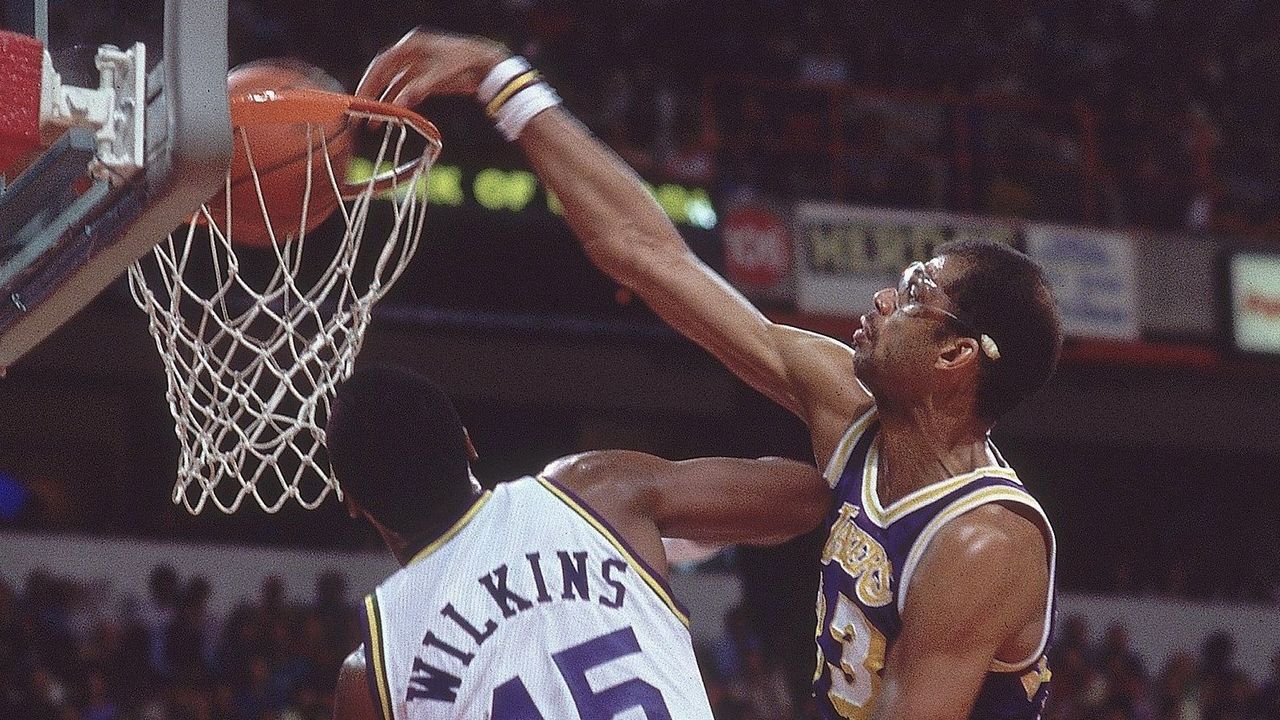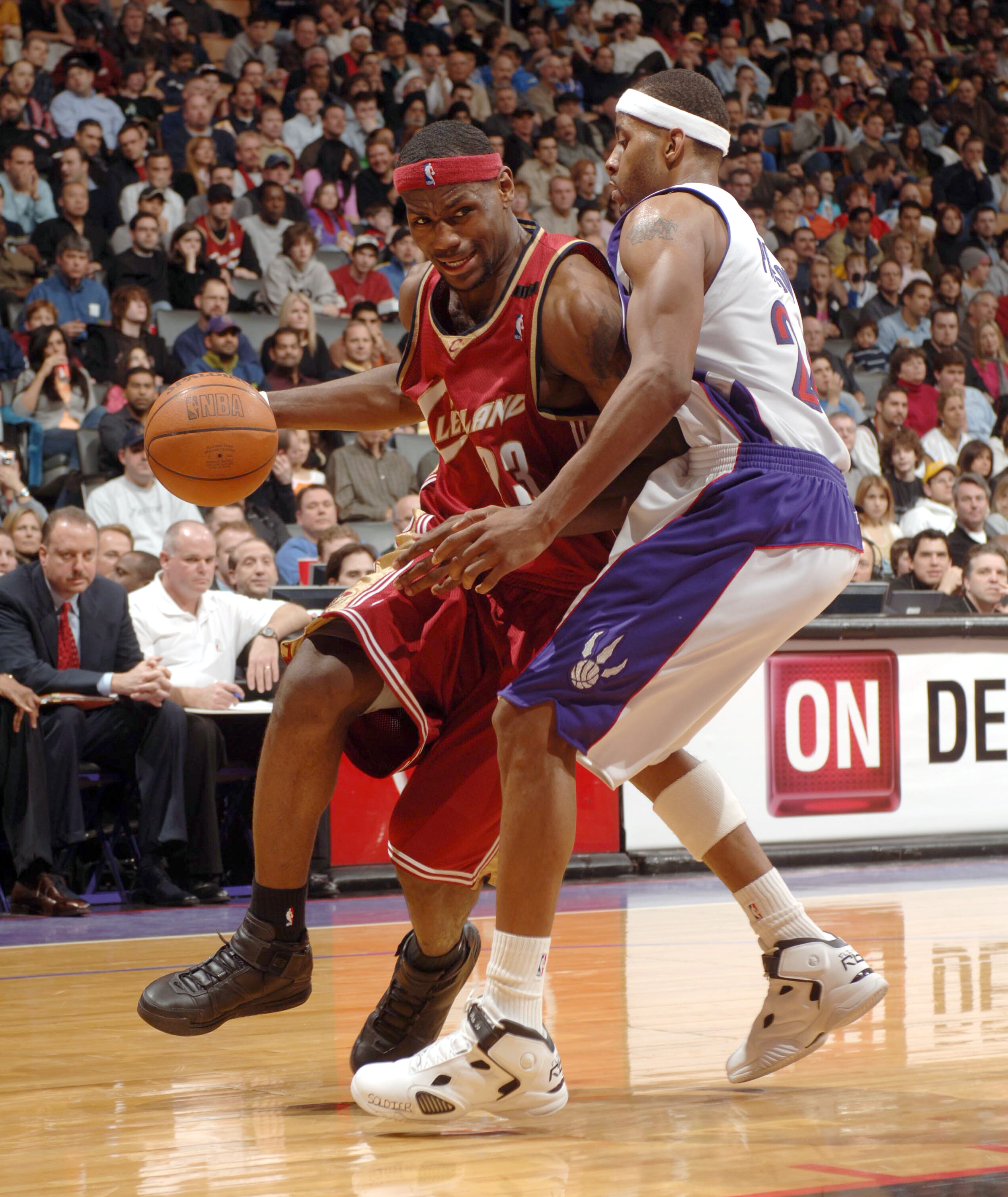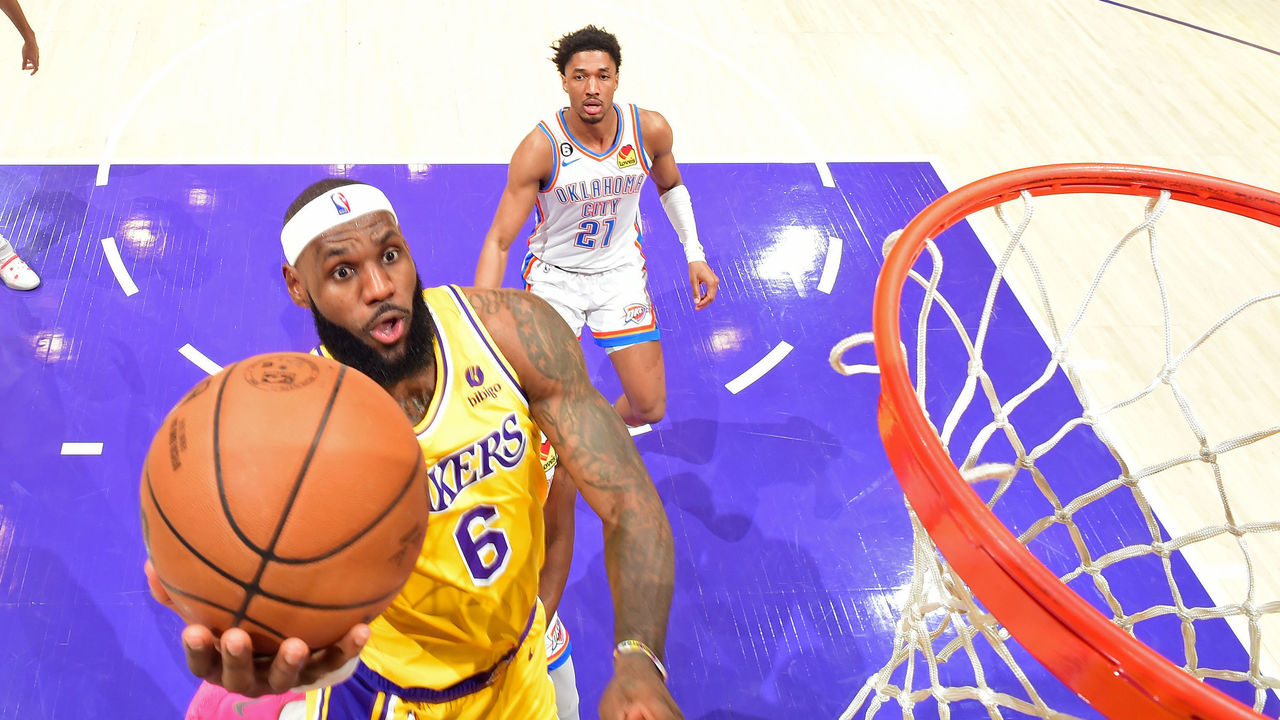'Pick your poison': How LeBron's scoring endured and evolved
As LeBron James marched towards the NBA's all-time scoring record, which he claimed from Kareem Abdul-Jabbar on Feb. 7, the basketball world collectively reflected on the weight of the moment. With every additional James bucket, every ferocious drive that inched him closer, a greater sense of awe enveloped fans.
Wherever James ranks on your list of all-time greats, his chase for basketball immortality - and the two decades of uninterrupted excellence required to get him to this point - provided much-needed perspective.
When Abdul-Jabbar used his patented skyhook to vault past Wilt Chamberlain as the NBA's all-time scoring leader in 1984, legendary Lakers broadcaster Chick Hearn summed up the achievement by echoing what many observers surely felt at the time: "This man has accomplished something that I don't believe - and I mean this sincerely - I don't think this will ever happen again."
The Lakers' captain would play another five seasons, adding 6,965 points to the figure Hearn and others already believed to be insurmountable.
Abdul-Jabbar's longevity is something to marvel at on its own, but James' consistent excellence is what separates him from anyone to ever play the game.

Consider that James, still comfortably entrenched in the top 10 in scoring this season, set the all-time scoring mark nearly 18 years after his first 50-point game: a 56-point effort against Toronto on March 20, 2005.
Other players to score 50-plus during the 2004-05 season were Damon Stoudamire, Allen Iverson, Jermaine O'Neal, Amar'e Stoudemire, and Dirk Nowitzki - five former stars who retired between four and 15 years ago. James, meanwhile, is averaging 30.3 points, 8.5 rebounds, and seven assists on 59% true shooting while playing more minutes than all but six players in the NBA.
About that night he scored 56 in Toronto: LeBron was actually coming off one of the worst performances of his sophomore season two nights earlier against Philadelphia (16 points on 3-of-20 shooting). Still, the young Cavaliers superstar was enjoying a breakout scoring season after averaging an impressive but inefficient 20.9 points as a rookie. Fueling his increased production and efficiency in Year 2 was a surprising improvement from behind the arc, after James shot only 29% as an NBA freshman.
James' inconsistent jumper was the closest thing to a weakness scouts and opponents could pinpoint early in his career. In addition, James' playmaking ability, and his commitment to making the highest-percentage play rather than forcing his own shot, meant the best hope of guarding a young LeBron was limiting his drives.
Matt Bonner, who carved out a 12-year NBA career and won two championships with the Spurs, was on the 2004-05 Raptors team that gave up 56 to James. As Bonner recalls, Toronto's defensive scheme for James was par for the course at the time.
"You still never want LeBron getting a full head of steam going to the basket today, but especially back then, it was like, 'Keep him in front of you, make him settle for jump shots, and we'll live,'" Bonner told theScore. "He ended up hitting a lot of high degree of difficulty shots. He hit (six) 3-pointers. That wasn't in our scouting report on him at that stage of his career."
As former NBAer and Raptors TV analyst Leo Rautins said at one point during that 2005 broadcast, after James knocked down a tough fadeaway on the baseline: "You want to encourage shots like that" from James as the defensive team. Unfortunately for the Raptors that night, and for countless teams over the next two decades, James had a way of getting what he wanted no matter how sensible the defensive game plan seemed.
In addition to his usual share of thunderous dunks and free throws (14-of-15 from the line), James converted six of his 12 3-point attempts, with a bevy of long, contested twos mixed in for good measure. There were plenty of fast breaks, too.
"I would often be the trail big at the top of the key (on offense), and if I didn't have a chance to get the offensive rebound when a shot went up, I'd have to be the one back in transition," Bonner explained. "There's no worse feeling than being the lone guy back and seeing LeBron bust out ahead of the pack, coming at you full speed ahead. You're just sitting there like a sitting duck. You're thinking, 'Oh my God, what is about to happen?' That's the worst feeling ever."
Plenty of players would tell you that the sight of James exploding out of the blocks to fuel a break is still as unsettling in 2023 as it was in 2005.

In a marvelous performance befitting of James' early years in Cleveland, the 20-year-old played all 48 minutes of that 2005 game in Toronto, recording 10 rebounds, five assists, and two steals to go along with his 56 points. He became the youngest player to score 50 points in an NBA game (although Brandon Jennings bumped LeBron to second on that list in 2009), and 56 stood as a career high for nearly nine years until James poured in 61 against Charlotte in 2014.
Eighteen years later, with James now the league's all-time scoring king, that 56-point performance remains one of his four highest-scoring games. According to Basketball Reference's Game Score metric, it's the 17th-best performance of James' career, with only Devin Booker's 70-point game against Boston in 2017 topping it among performances before a player's 21st birthday.
In retrospect, it's fitting that the first truly iconic performance of James' career came in Toronto against the Raptors. More than a decade later, James would become perhaps the most haunting figure in Raptors history; his postseason dominance over the team was so outrageous that ESPN's Mark Jones dubbed the city "LeBronto."
After watching the tape, there was actually a stepback fadeaway in front of the Raptors' bench late in that 2005 game that, years later, seems like an eerily prescient warning of sorts: It was during a 2018 playoff game on the same end of the same Toronto floor that a flurry of seemingly impossible James jumpers spawned the "LeBronto" moniker.
You can hear the disbelief in the 2005 Toronto crowd when that fourth-quarter jumper from the baseline found nothing but net. It was part awe and admiration, but also the sound of collective deflation. Though the Raptors pulled off the upset that Sunday afternoon in 2005, perhaps fans in attendance were coming to grips with the fact they'd play a supporting role in what would one day soon become James' show. It's a feeling countless opponents and opposing fans have had to deal with over the last 20 years.
Much like James' record-breaking night this week, LeBron didn't get enough help to win on his big night in 2005. Cleveland's loss in Toronto was part of an 11-19 finish to the season that saw the Cavs fall from third place in early March to ninth place by season's end, leaving them on the outside of the East playoff picture.
The Cavs' 2005 downfall certainly can't be traced back to James. The 20-year-old sophomore averaged 27.2 points, 7.4 rebounds, 7.2 assists, and 2.2 steals while leading the league in minutes, with Cleveland outscoring opponents by 2.1 points per 100 possessions with James on and losing non-James minutes by 6.7 points. Despite a woefully underwhelming supporting cast of Jeff McInnis, Zydrunas Ilgauskas, Drew Gooden, Eric Snow, Ira Newble, Robert Traylor, and Lucious Harris, James led the 2004-05 Cavs to Cleveland's first winning season in seven years.
"No offense to the other people on the team, but he did not have a lot of help," Bonner said when reminded that the '05 Cavs finished with 42 wins. "That's unbelievable, and I know we're talking about his scoring, but that doesn't happen if LeBron isn't the passer that he is. If he was going out just trying to get 40 every night, that Cavs team doesn't finish with a winning record. He was able to take that roster and will them to a winning record because for as many points as he scored, he played team basketball, winning basketball."
Nearly two decades since dragging that Cavs team to respectability, the burden on James' shoulders has barely diminished. He's posting the fifth-highest usage rate of his career, and his highest since 2009-10. Meanwhile, a poorly constructed Lakers team that's missed Anthony Davis for large stretches of the season still wins LeBron's minutes by more than three points per 100 possessions. When the 38-year-old sits, L.A. is outscored by nearly eight points.

By the time Bonner was on the fabulous Spurs teams that squared off against LeBron's Heat in the 2013 and 2014 Finals, James was at the height of his powers, and the scouting report had changed … slightly. The wonky jumper that caught Toronto by surprise years earlier was now a tried and true component of James' repertoire.
James fine-tuned every aspect of his game over the first decade of his career, including his post play after he failed to consistently attack mismatches in a humiliating 2011 Finals loss to Dallas. But it was his stunning improvement as a shooter that fueled the best all-around seasons of his career while playing on one of the greatest teams ever assembled.
After shooting under 33% from deep over the first eight years of his career, James knocked down 38.5% of his long-range attempts over his final three seasons in Miami. In 2012-13, he converted at a 40.6% clip.
James' 2012-13 season is one of only 10 in which a player who qualified for the scoring title shot at least 60% from two-point range and 40% from deep. The other players who did it averaged between eight and 19 points per game during those absurdly efficient seasons; James averaged 26.8 points.
"You had to pick your poison," Bonner, now a Spurs TV analyst, said of defending what many consider to be Peak LeBron during those Finals runs. "You still couldn't just run him off the 3-point line, because then he was coming full speed at the basket. But you also couldn't give him a big cushion out there and then just contest at the end. You weren't baiting him into shooting anymore. And there was one spot on the floor, I think it was the left high quadrant, where you couldn't let him shoot at all. If he had it there, you had to be up on him like he was a shooter.
"I guess in general, even in 2013 and 2014, we were still trying to make him shoot jump shots. That was still the goal, but it wasn't ideal, because now you knew he was still going to do damage like that."
Sure enough, after the Heat rallied back from down 3-2 against San Antonio in the 2013 Finals, James put the Spurs away and helped Miami clinch a second straight championship with his suddenly dependable jumper.
Ten years later, at the stage of an athlete's career when the few who've lasted this long would be on their last professional breaths, James' production still rivals that of his peak seasons in Miami - which came nearly a decade after his first 50-point performance.
"When I made it to the NBA and saw what that grind was, how physical it was, and the toll it takes on your body, I just thought for longevity purposes, no one could catch Kareem," Bonner said. "Like how could anyone possibly stay healthy while being that productive for that many years? Somehow, LeBron's been able to do it."
LeBron's durability is amazing & his ability to play w/ injury has been a driving force in breaking this record. I have 165 injury events logged for LBJ, including 32 ankle sprains, tendinitis, pleurisy, a parotid gland tumor, a G2 groin injury, & numerous other strains & sprains
— Jeff Stotts (@InStreetClothes) February 8, 2023
At this point, James has stacked multiple elite career segments into one unique and remarkable career. He was a prodigious and prolific young superstar who did things that were once unfathomable in a grown man's league. He's now achieving the impossible as someone who should be too old in a young man's league. In between, at his very best, he was perhaps the most unstoppable and inevitable force the game has ever seen.
Whether you believe that to be true or not, there's no longer any debating who the greatest scorer in basketball history is.
Joseph Casciaro is theScore's senior content producer.